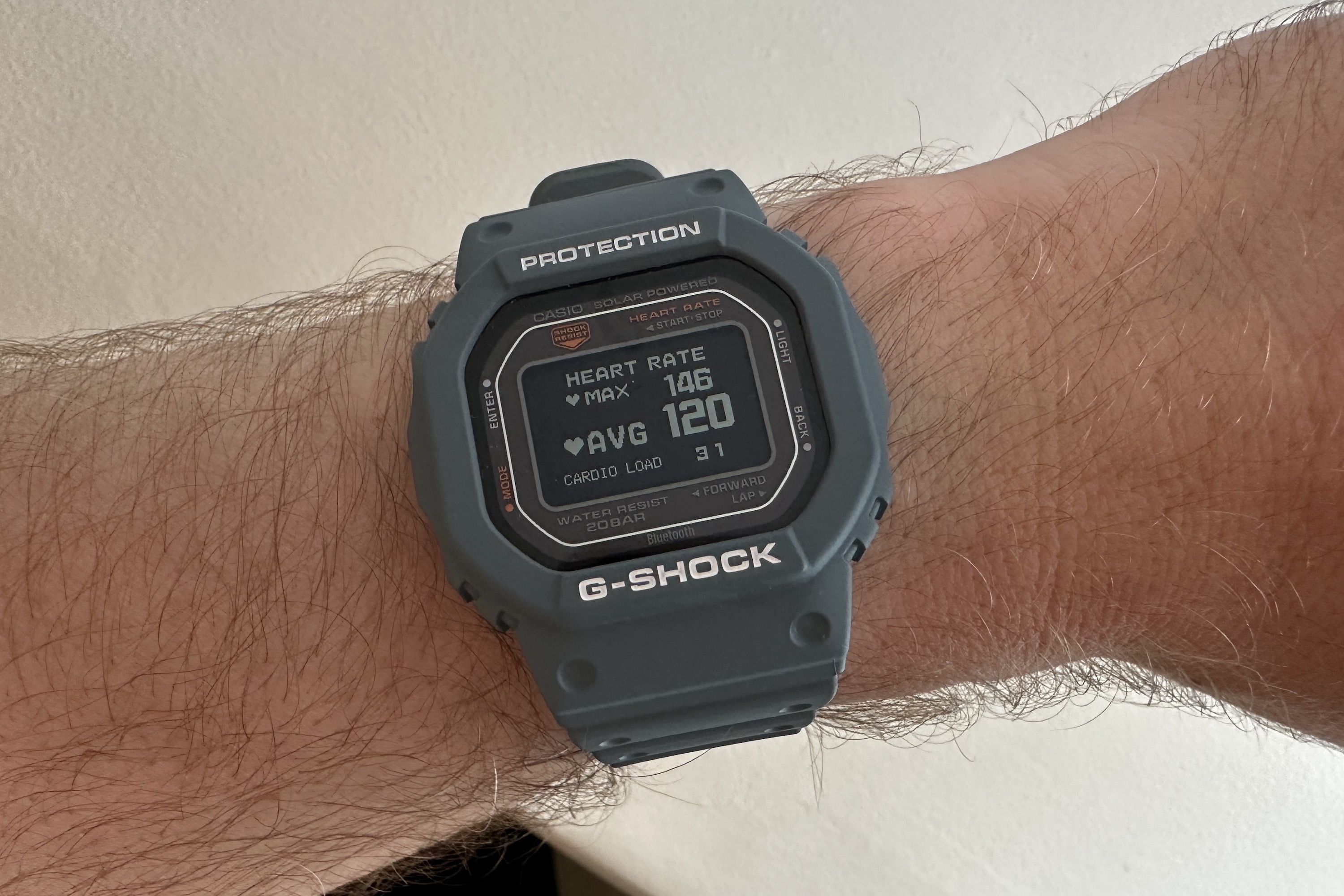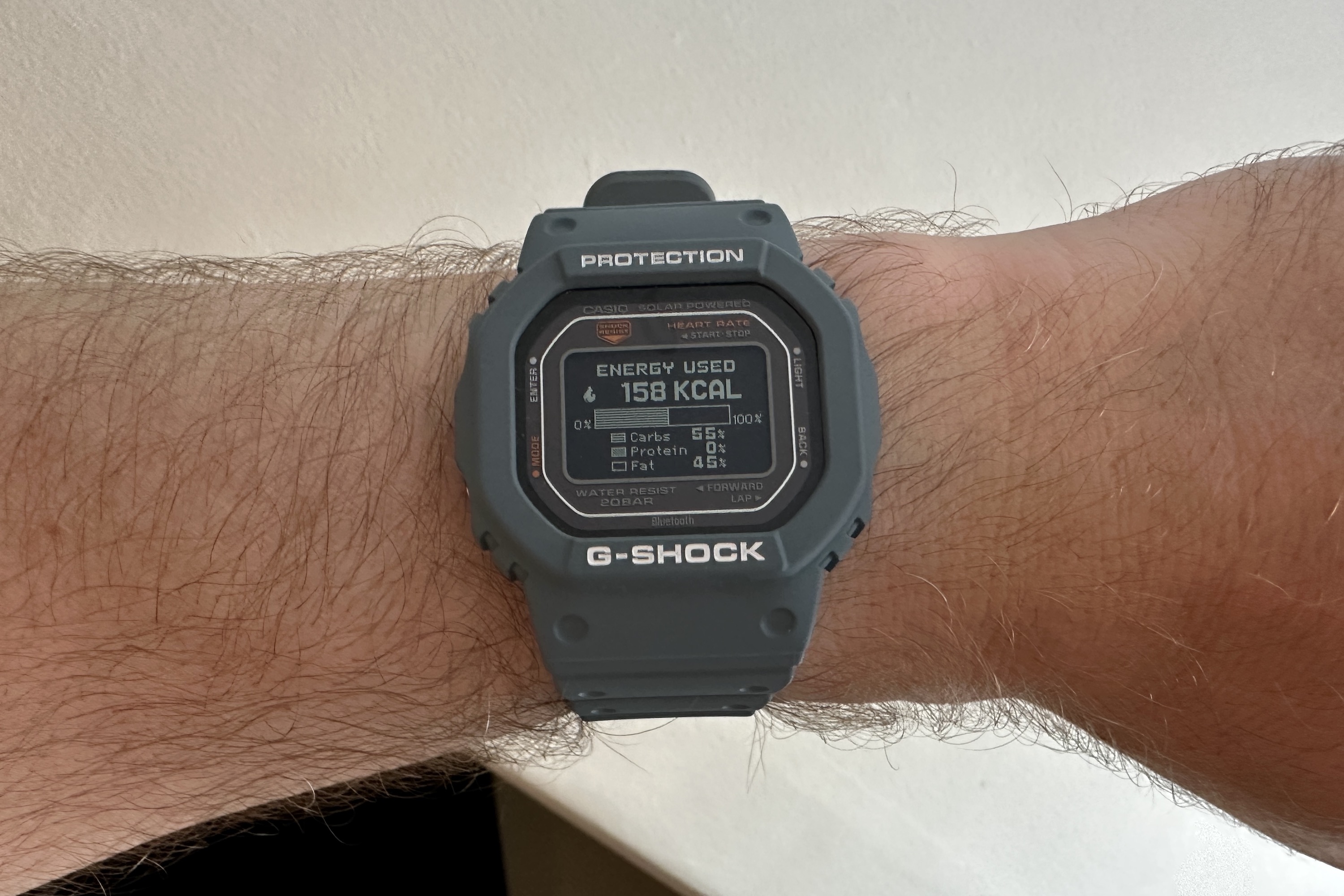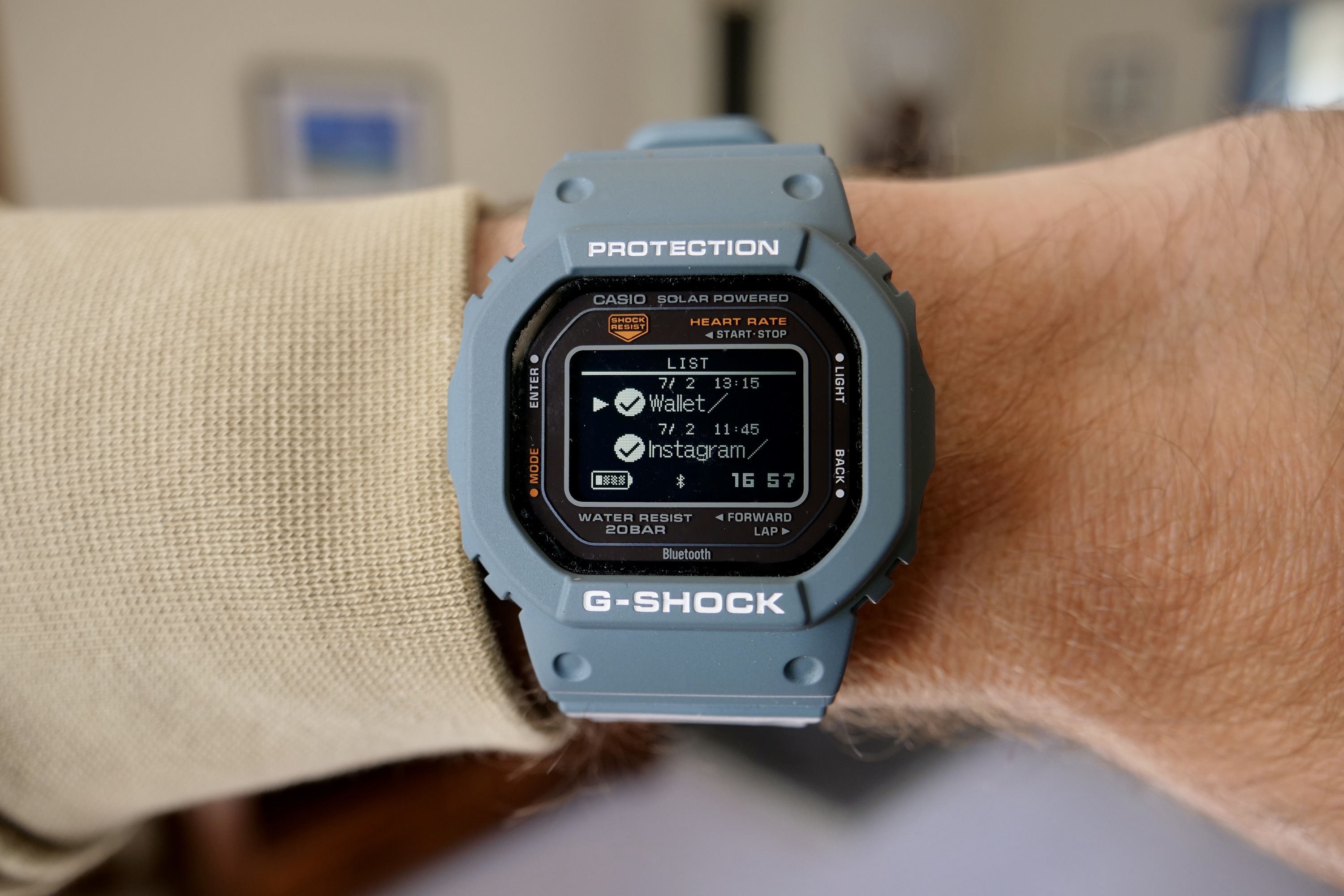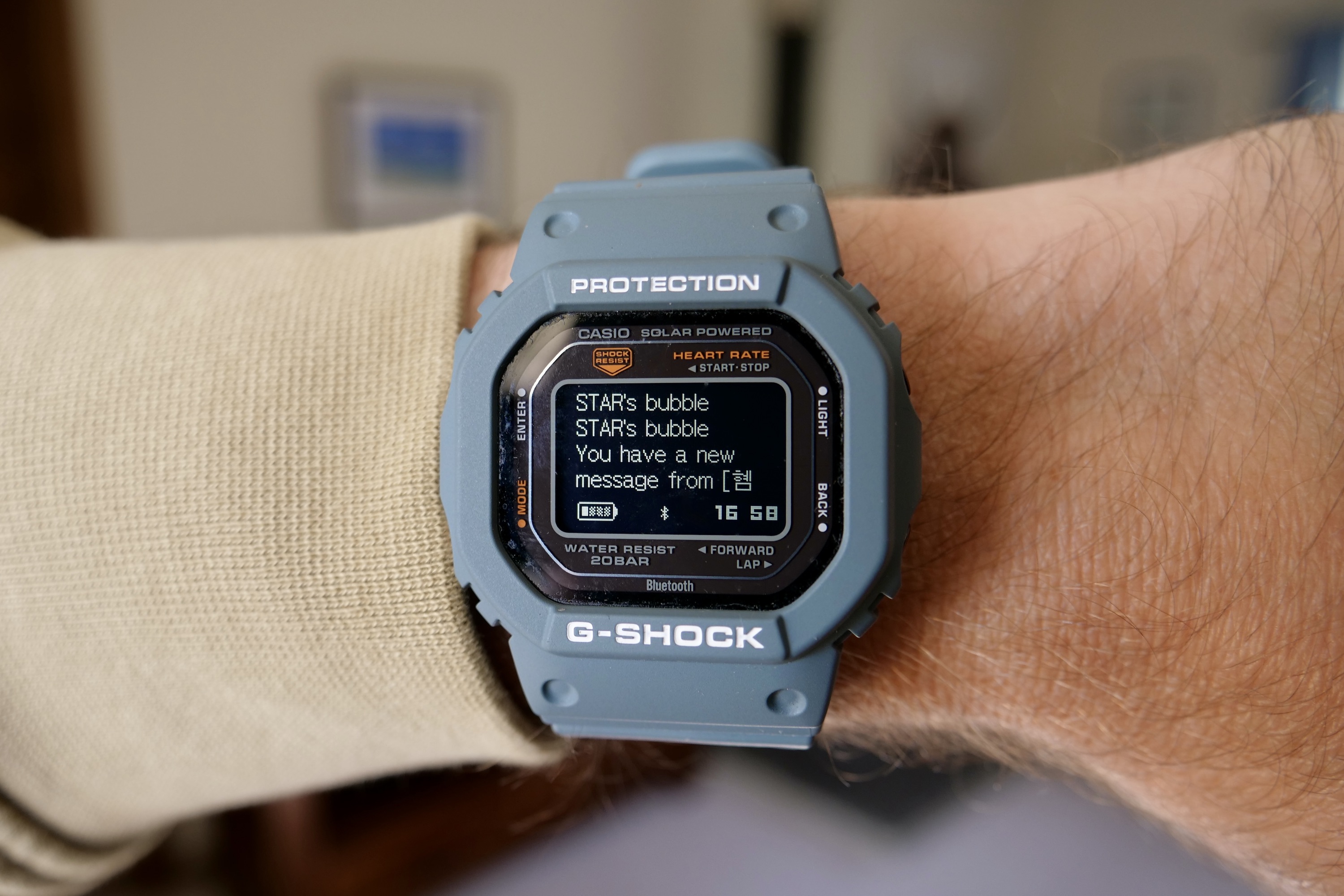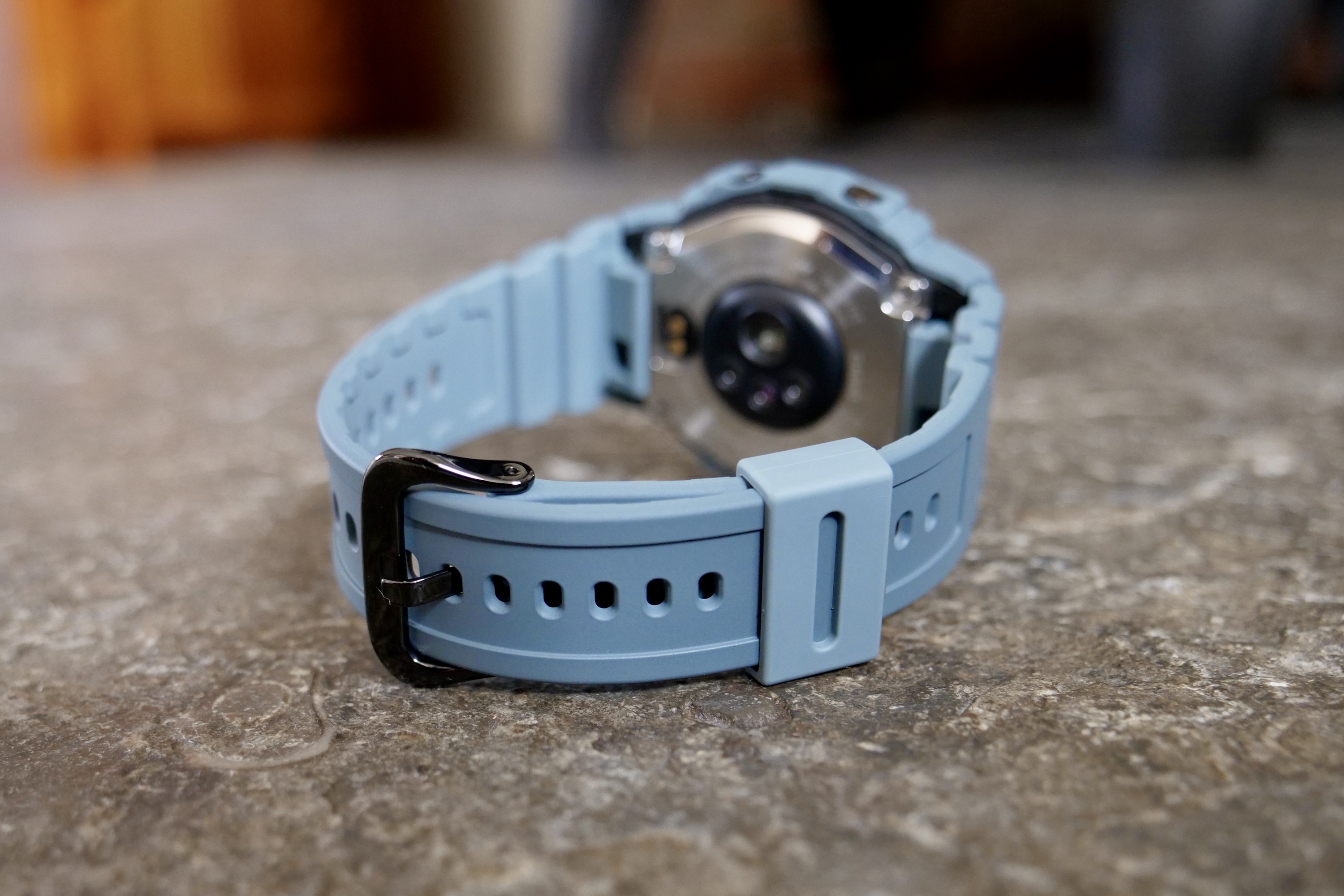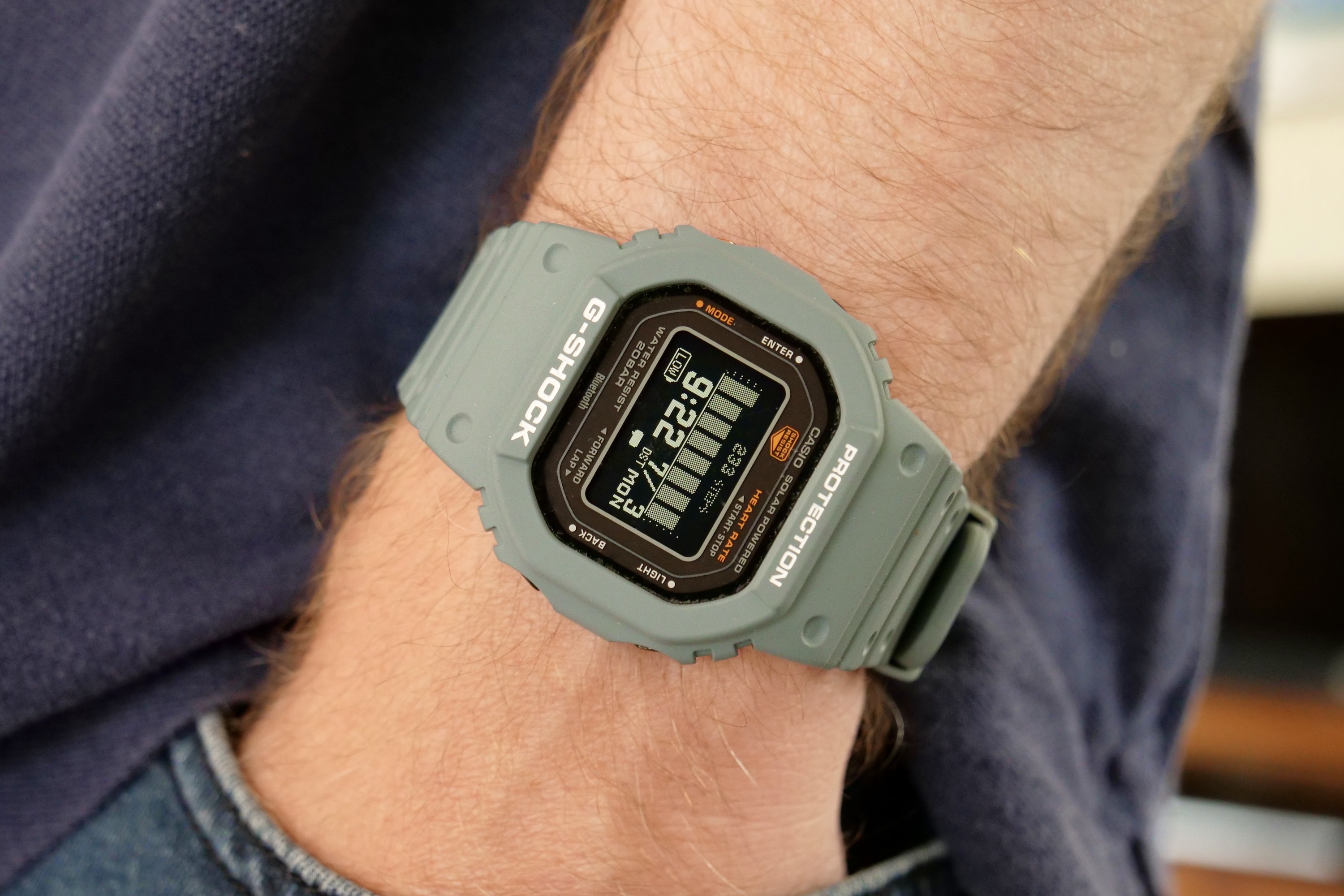
Casio G-Shock DW-H5600
MSRP $299.00
“The DW-H5600 isn’t a perfect smartwatch, but for anyone who’s been put off by previous G-Shocks but likes the idea of wearing one, it’s a great option to consider.”
Pros
- Light and comfortable
- Classic G-Shock design
- Solar and USB charging
- Notification support
- Great casual activity tracking ability
Cons
- Will require regular USB charging
- Awkward buttons
- No Apple Health/Google Fit sync
The G-Shock DW-H5600 is Casio’s most complete, most wearable, and probably most anticipated connected fitness watch yet. It ticks all the right feature boxes on paper, with no risk of its design alienating hardcore G-Shock fans in the way the challenging GSW-H1000 touchscreen smartwatch did, and is svelte enough to fit on most wrist sizes. It’s the G-Shock fitness watch we’ve been waiting for.
But by offering more, and having to charge a higher price for it, the watch now needs to prove itself against far more capable smartwatches, and that’s a big ask. I’ve worn it for a while to find out if it can or not.
Casio G-Shock DW-H5600: design and comfort

In the world of G-Shock watches, the DW-H5600 is known as a “square,” (even though it’s not) and it’s probably the most recognized of the G-Shock designs, as it hasn’t really changed since the very first model was introduced in the 90s. It’s svelte for a G-Shock, at 51mm x 44mm x 17mm, and it weighs just 59 grams. It’s the G-Shock for people who hate G-Shocks, as it mostly avoids the massive button guards, tank-like styling, and huge girth that’s a turn-off for anyone who dislikes a wrist-dominating watch.
It’s still a proper G-Shock watch though, so it is shock resistant, vibration resistant, and water resistant to 200 meters, and you really will have to work very hard to destroy it. This is all part of every G-Shock’s appeal, but where the H5600 differs from most other square models is the heart rate sensor on the back. The stainless steel case back is dominated by the protruding sensor array, which measures heart rate and blood oxygen levels, but it never feels anything other than supremely comfy to wear. I also love the new bio-based resin material for the strap, which is softer and more pliable than older G-Shock straps.

Casio has been boosting the fitness tracking ability of its connected watches for a while, and the H5600 has similar functionality to the GBD-H2000 we reviewed recently, but here it’s wrapped up in a far more conveniently shaped case, with a step up in functionality compared to another, excellent connected square G-Shock, the GBD-200. The smaller, lighter watch can be worn all day and overnight, too, unlike the GBD-H2000, which is just too ungainly for use as a sleep tracker.
Where the H5600 fails is in the ergonomics of control. The watch is operated using four physical side buttons, but they’re heavily recessed in the tough resin case, and it takes effort to press them. If you’ve got big fingers, it could be a very frustrating endeavor, and even if you don’t, it’s not a fast or particularly pleasant method of interaction. However, this isn’t unique to the H5600 specifically, and you have the same problem on just about every square G-Shock.

Under normal circumstances on a non-connected G-Shock square, you don’t really get involved with the buttons that much, but here it’s far more important, and to make use of the functionality, you’ll press (or try and press) the buttons throughout the day. It’s a pain until you get the knack, but even then, this is no Apple Watch. There are some that will welcome the old-school need to press awkward buttons, while others will actively hate the watch for being unfriendly to use.
I don’t think it’s a dealbreaker, provided you know what to expect. If you’re coming from a touchscreen smartwatch or fitness tracker, it’ll take a bit of getting used to, but if the H5600 is another square G-Shock in your collection, your fingers will already be used to awkwardly wrapping themselves around the watch’s case just to activate the backlight. That classic square shape is full of appeal, though, as I love the way the H5600 looks on my wrist, how it goes with most things I wear, and that I’m always proud to show it off. I can’t say that about many other connected watches.
Casio G-Shock DW-H5600: fitness tracking

Once you’re past getting frustrated with the 5600’s buttons, it’s time to start a workout, which involves … pressing the buttons. Thankfully, it’s not a long-winded process, and the H5600 tracks walking, running, and gym workouts. Information is shown on the Memory-in-Pixel (MIP) screen, which is clear but not particularly bright when exercising outside. Once completed, workout data is shown on the screen, and there’s no need to look at the app.
When you do open the app, there’s plenty of data for the casual fan, with average and maximum pace, cadence, stride, and heart rate zones displayed, along with energy used and cardio load graphs. It’s not as in-depth or motivational as Garmin’s platform, and the only real push to do more is the cardio load status on your daily stats, which indicates if you’re training hard, maintaining, or slipping.
The H5600 continues Casio’s partnership with Polar, and the activity brand adds its data expertise to the watch and app’s software. The heart rate sensor’s results mostly match other devices, showing the same average heart rate count during a workout as the Oura Ring, but it can count a higher maximum, which has resulted in a slightly higher calorie burn than the Oura or the Apple Watch Series 8. None match each other exactly, but none are medical devices, so this is expected.
I’m reviewing the G-Shock DW-H5600 shortly after the Garmin Epix Pro (Gen 2), and the two couldn’t be more different. The H5600 suits my lifestyle more, as it tracks the activities I do most, while the Garmin is completely overkill for me. The H5600 isn’t going to satisfy the incredibly active person’s thirst for performance data, feedback, and motivation. Instead, it tracks simple, core workouts, and the data helps you maintain a generally active lifestyle.
There’s not much room for growth, though, so if you expect to increase your activity levels or try out new sports, then the H5600 probably won’t keep up. This is where a far more comprehensive fitness watch makes sense, or a top current smartwatch like the Apple Watch or Samsung Galaxy Watch 5, as they have a greater degree of functionality ready to be exploited in the future.
Casio G-Shock DW-H5600: Casio Watches app

Casio requires the installation of its Casio Watches app to connect the H5600 to your phone. The old G-Shock Move app used with the GBD-200 has been retired, and Casio Watches acts as a one-stop-shop to manage the watch’s time, date, and other core features — along with checking your health data, and as a catalog of your entire collection as multiple G-Shocks can be registered through it.
It connects reliably, and the watch has also received notifications from my phone. These appear on the screen as an alert initially and are then filed away in the Notifications folder, where they can be reviewed in more detail later. I’ve found these helpful as guidance on whether I need to reach for my phone or not, but due to the awkward buttons and dense menu structure, digging into the notifications folder to read more isn’t something I’ve done much.
To find what you want in the app, you also have to go digging. The multi-function nature means there’s a lot of information and screens, and it’s not always obvious where things are hidden. There’s a learning curve to it, but once you’ve found the fitness and health data and are used to navigating the app, it’s well-presented and informative.

Casio has worked to integrate its old apps (G-Shock Connected and G-Shock Move) into one within Casio Watches, and it’s a decent effort, but there are some problems. It’s a shame the Home page is just a big advert for other G-Shock watches, as this spoils the experience, you can’t select your own photo for the Profile image to personalize it more, and it’s definitely not the speediest performer either.
But worst of all is the lack of third-party app integration. Casio Watches does not connect with Apple Health, Google Fit, Strava, or any other popular fitness ecosystem. You’re forced to live solely in the Casio Watches app, and this limits its usefulness and appeal to anyone who is serious about sport and fitness.
Casio G-Shock DW-H5600: battery and charging

Casio is an expert when it comes to solar charging. Its Tough Solar feature is a staple on many of its G-Shock watches, and over the past couple of years, it has leaned on the technology to keep its connected watches going too. However, we may be reaching the limit of what it can achieve. I’ve worn the DW-H5600 for around two weeks, during the sunniest weather the U.K. has seen in 2023 so far, and despite it being constantly exposed on my wrist, it simply hasn’t collected enough natural light to effectively charge the battery.
I’ve had the 24-hour-a-day heart rate and blood oxygen monitoring feature active, just as I would on any other smartwatch, and I’ve also worn it to track sleep. I’ve tracked a few workouts, including some with GPS, but certainly not every day. It has also received notifications from my iPhone 14 Pro. The battery reached one bar out of four after about seven days and then returned a Low Battery warning and refused to connect to my phone after 10 days.

My review model does seem quite slow to charge using light, though, and even after a day on a windowsill, it only gained a single bar on the indicator. The GBD-H2000 didn’t have the same level of battery drain, indicating the H5600’s solar cell and battery may not be able to handle the amount of energy required for 24-hour monitoring, notifications, sleep tracking, and workout tracking without help.
Casio includes a proprietary charging cable — which looks like a massive crocodile clip — and it clamps onto the watch where the charging terminals are located, allowing the battery to be charged without using solar. It takes about 100 minutes to fully charge the battery this way. If you plan to use the H5600’s functionality to its fullest, based on my experience, expect to do this once every week.
Casio G-Shock DW-H5600: price and availability

The Casio G-Shock DW-H5600 is available now. There are two versions available in the U.S., the DW-H5600-2, which is the blue/gray version seen in our photos, costs $299. It’s joined by the DW-5600-1, which comes in a simple black color. In the U.K., both these versions cost 269 British pounds, but you can also buy a version with a metal bezel for 289 pounds (about $367). For 389 pounds (about $494), you can get a version with swappable bands, and bezels that commemorate G-Shock’s 40th anniversary.
At $299, it’s $100 less than the GBD-H2000, with the primary difference being the design. It’s twice the price of the GBD-200, which seems to be still available, and it may suit you more if you put watch design and style over complete fitness tracking ability. Outside of the G-Shock range, the price puts it alongside the Apple Watch SE 2 and the Samsung Galaxy Watch 5, which are more fully-featured touchscreen smartwatches.

I don’t really see the G-Shock as a competitor to these smartwatches, but instead to more watch-like models like the Garmin Vivomove Trend and the Fitbit Sense 2, especially if you really value the fitness aspect. It’s also a far better choice for watch fans over a fitness band from brands like Fitbit, with its classic styling and immense durability. You can wear it with just about any outfit, and it looks great.
Casio G-Shock DW-H5600: verdict
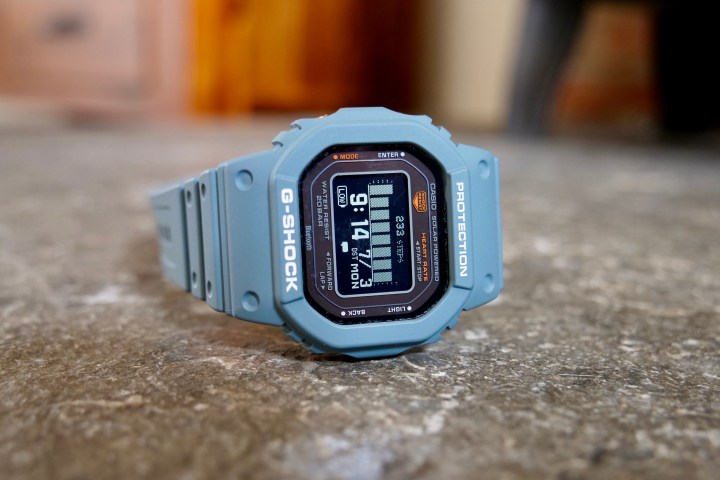
The G-Shock DW-H5600 is quite a confusing watch. On one hand, it’s the ideal fitness-tracking G-Shock, as it’s light, modestly sized, and comfortable, plus it has a heart rate sensor for relatively comprehensive fitness and activity tracking. But on the other, it’s likely to need charging once a week, it doesn’t integrate with other key fitness platforms, the controls will seem antiquated to some, and it costs as much as some excellent full touchscreen smartwatches.
G-Shock fans and people who want to wear a good, non-touchscreen watch will like it, but only if they don’t expect to use much more than fairly basic fitness tracking now or in the future. Anyone used to an Apple Watch will find the controls annoying. The fact that the solar power — such a great benefit on the GBD-200, for example — doesn’t seem to have the guts to solely energize the watch means you’ll have to charge it on a regular basis, much like you will with a Garmin Vivomove Trend, Polar Pacer Pro, or other watch-like fitness smartwatches.
It is the connected fitness watch for active people who have always loved the idea of life with a G-Shock.
The G-Shock DW-5600 is right on the crossover point between how far Casio can take its non-touchscreen connected watches — in terms of ability, battery, design, and price — and us just telling you to buy a full touchscreen watch because it’s easier to use, does more, and it’ll be better for you in the long run. I really like the G-Shock DW-H5600, but if I really wanted a good $300 activity-tracking watch that would spur me on and grow with me in the future, I’d probably pick the Apple Watch SE 2 or Garmin Vivomove Trend instead. Or, I’d make do with the Oura Ring, which tracks basic workouts without a problem, is better at sleep tracking, has an excellent app, and has strong battery life. That way, my wrist is free to wear any G-Shock at all.
I’m not sure the H5600 is quite good enough to be the G-Shock to usurp its full smartwatch competition, but it is the connected fitness watch for active people who have always loved the idea of life with a G-Shock but couldn’t previously deal with the size.
Editors’ Recommendations


